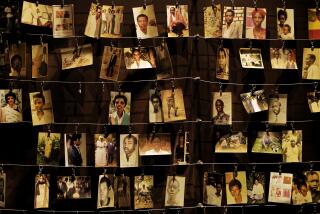A Sad Cassandra Looks at U.S. Policy
- Share via
WARSAW — Many political analysts and commentators say that everything was so very predictable about East Timor. And indeed it was. In early February this year, fresh from a New Year’s celebrated in Dili and after three years spent working in Kosovo, I warned in these pages about the problems facing the territory.
I reminded readers what Bill Clinton, then a presidential candidate, had declared several years ago about East Timor: “We have ignored it so far in ways that I think are unconscionable.” I urged the Clinton administration to get engaged in a conscionable way. I ended my opinion article with a call: “The time to act is now, before we are forced to act by headlines on some new atrocity.”
I even had some concrete recommendations: “If East Timor decides to go its own way, it will need to be a U.N. protectorate for some time, and no effort should be spared to help, even if peacekeeping forces are required. It is easier to be peacekeeping than war-stopping, as we learned the hard way in Kosovo.”
Well, we didn’t learn, and now I could preside over “Cassandras Without Borders.” But the business of predicting that President Clinton and his team are about to step on the same rake that banged them on their faces once already is so easy. Clinton now seems resolved to repeat the same mistakes he made in the Balkans a year ago.
I just returned from a longer stay in Kosovo and the tragedy of what happened (and still goes on) there is fresh in my mind. The ethnic cleansing accelerated there after the full deployment of the Kosovo Verification Mission (a “deal” of sorts negotiated by Richard Holbrooke with Yugoslav President Slobodan Milosevic). To hope that thugs from the Interior Ministry would be less thuggish because there will be international observers around the province never made sense.
It took an almost total, apocalyptic exodus of ethnic Albanians from Kosovo and seven weeks of bombing for the Belgrade-sent thugs to stop freely committing their thuggeries in Kosovo. Now, a year after those verifiers were sent to Kosovo, President Clinton is speaking about East Timor. And what he says shows that some lessons are never learned in his White House.
On Friday, Clinton said in a statement issued aboard Air Force One: “It is now clear that the Indonesian military is aiding and abetting the militia violence.” And his national security advisor, Sandy Berger, explained why the administration tries to deal with militias’ violence by talking to the army from Jakarta: “We have focused on where we believe the decisions are being made--which is the Indonesian military.”
So the Clinton administration did learn to identify a thug when it sees one? Not so fast. On Monday, the Friday warnings seemed yesteryear’s. Again the same duo made statements, after Jakarta accepted an international force going to East Timor. President Clinton: “My view is we should work with the Indonesians in a cooperative fashion. Perhaps they should have some parallel presence, even.” And Berger: “The logical way to do that is to have, at least in the beginning, the Indonesian forces there alongside the peacekeeping forces.” Zip the two files and you get, “We should work . . . in a cooperative fashion” with the Indonesian army, which “is aiding and abetting the militia violence.” Do those two men know something that a normal person cannot know, or do they hope for something that a normal person cannot hope for?
More to Read
Sign up for Essential California
The most important California stories and recommendations in your inbox every morning.
You may occasionally receive promotional content from the Los Angeles Times.










